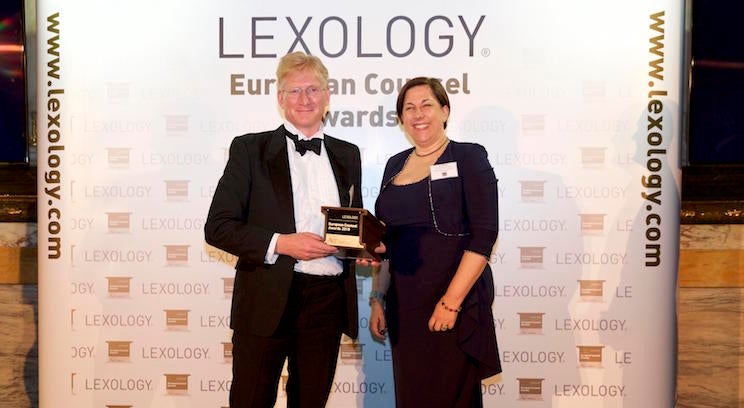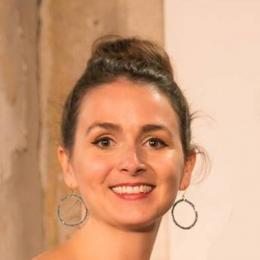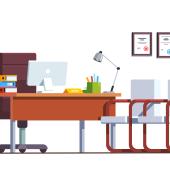
One in 4,000 — those were the odds to win the Lexology/ACC European General Counsel of the Year award. For a legal-minded numbers guy like Alasdair Moodie, Thermo Fisher Scientific’s vice president and general counsel of Europe, Middle East, and Africa (EMEA), he knew that the chances of receiving the honour were slim. But for the multiple colleagues and peers who nominated him, it wasn’t a surprise when he did.
“Alasdair has developed the culture of the EMEA Legal team through a bold and transformational strategic vision, which in turn has repositioned EMEA Legal as a key strategic business partner for these businesses,” one respondent said.
To discover what made him stand out in such a competitive field, we asked him about his start in life sciences, his team’s strategy to support the company, and his personal mission to help a leading dementia charity in his spare time.
ACC: I see that you were a life science graduate of the University of Edinburgh. Why did you pursue that concentration, and what were your career plans after graduation?
Alasdair Moodie: I have always been interested in the life sciences, going back to school biology lessons and studying “how the body works.” Originally, I went to university to study medicine intending to become a doctor, but ultimately came to the conclusion I was more interested in the life sciences industry — I was regularly spending lunchtimes reading the Financial Times. So I investigated a range of career options that would enable me to build a career in the life sciences sector and ultimately decided a legal training would be an interesting way forward.
ACC: You later attended the College of Law, York. Why did you want to pursue a legal career?
Moodie: Having looked at a few options like finance (as a scientist, I was not frightened of numbers), I decided that law was an interesting route into business. Given my medical and life sciences background, I realized that lawyers had an important role to play in the life sciences sector. For example, it was heavily regulated and dependent on the creation, protection, and commercialization of intellectual property. My enquiries to senior leaders working in the life sciences sector confirmed for me that law coupled with science could offer an interesting and rewarding career with a great purpose: bringing better health solutions to the world.
“I realized that lawyers had an important role to play in the life sciences sector.
— Alasdair Moodie, Vice President and General Counsel of EMEA, Thermo Fisher Scientific
ACC: What inspired you to do in-house law?
Moodie: I have always been interested in business and, whilst being completely open-minded to various career options (e.g., law firms, public sector, charities), I always felt I would end up spending most of my career in business. In training at Linklaters, I was fortunate in joining a law firm that had many pharmaceutical, biotechnology, medical devices, and healthcare clients, and indeed I qualified into the intellectual property department. Before Linklaters, I was an intern stagiaire at the European Commission in Brussels for Science, Research and Development, and Competition, and although it was an interesting and memorable experience, I was drawn to working in business. Understanding the application of law in business — rather than law in its own right — was what interested me.
ACC: Why did you decide to work at Thermo Fisher Scientific?
Moodie: I have spent most of my career serving in roles of increasing responsibility and leadership in therapeutics companies — big pharma, biopharmaceutical, and biotech companies, supporting the discovery, research, development, and commercialization of therapeutic products and dealing with the wide range of often complex legal issues encountered in such intricate businesses. As the world leader in serving science, Thermo Fisher is active in most areas of the life sciences and healthcare technologies, other than drug discovery and research. Given my skills and experiences, it was a great opportunity to join a diverse, complex, rapidly growing, and changing multinational organization and to lead its European (now EMEA) Legal team.
ACC: What are some common risks that you and your legal department face, and how do you mitigate them?
Moodie: Thermo Fisher has a large presence in EMEA, with currently over 20,000 employees in more than 150 sites, generating more than US$5.5 billion in revenue. The role of EMEA Legal is to support the diverse range of business units comprising the EMEA business footprint by enabling growth (high performance with high integrity) and managing risk. Given the diversity and location of the businesses, the EMEA Legal team faces a very wide range of issues relating to risk. Strategically, we have gradually aligned, calibrated, and localized legal resources against the EMEA business footprint in order to provide joined up “legal radar” for the entire EMEA business.
“The business does not stop changing and neither will we — that is both our burden and our privilege.
— Alasdair Moodie, Vice President and General Counsel of EMEA, Thermo Fisher Scientific
We are now using this organizational structure to implement EMEA-wide and technology-enabled standardized systems and processes, empowering us to drive down systemic risk. As an ex ample, we built an award-winning (Legal 500 Litigation Team of the Year 2017) interactive litigation database that helps the lawyers with workflow management and enables them to use resources more effectively. The database is updated on a real-time basis and enables the team to bridge the gap with other departments and the global headquarters by providing updates and relevant information on cases across the region.
ACC: What are the biggest concerns that general counsel (and in-house counsel overall) are facing today? Any suggestions on how to resolve them?
Moodie: In terms of concerns facing general counsel, in addition to what I have mentioned elsewhere, in a nutshell, I think the challenge is to remain operationally appreciated, meet the needs of the business (but not necessarily the “wants” of the business) while building a resilient accountable infrastructure that supports the lawyers and the business to manage predictable repeat activity, and then contribute to the strategic direction and ambition of the business. All of this must be done efficiently, ethically, and with a sense of making an evidentially robust, real, and valued contribution. A lot of this is not easy, and therefore, equipping our teams to have the skills and the support they will need is also essential.
ACC: You were recently honoured with the 2018 Global Counsel Award. Tell us about that.
Moodie: It was a real surprise. I was contacted out of the blue and had been told I was shortlisted — I was delighted and honoured to then receive the 2018 European General Counsel of the Year Award. I am fortunate in leading a great team of talented, respected, and dedicated lawyers. What we have accomplished has truly been a team effort. I think it is important to appreciate that change can be really difficult, it can be uncomfortable, and it can be hard to get it right. However, never underestimate the need to communicate (and to keep communicating), and never underestimate how small changes can create momentum. The success we have had is fragile, and now one of our challenges is to keep going and not to rest on our laurels. The business does not stop changing and neither will we — that is both our burden and our privilege.
One reason why I wanted to join Thermo Fisher back in 2012 was that I was excited by its compelling vision, which included effectively doubling the size of the business by 2020. To my mind, that implied sustained and significant change and lots of interesting challenges for legal in aligning with this vision. This included initial strategic analysis and formulating a strategy, followed by operational implementation.
So, over the last five years, through strategic transformation and change management, we have been building our first coordinated pan-regional legal services operation, investing in technology-enabled process solutions, and delivering significant cost-effective competitive advantage to the business.
“I think it is important to appreciate that change can be really difficult, it can be uncomfortable, and it can be hard to get it right.
— Alasdair Moodie, Vice President and General Counsel of EMEA, Thermo Fisher Scientific
ACC: As a follow-up to the previous question, what are some of your accomplishments and contributions that led you to that award?
Moodie: An important initial accomplishment was to persuade Thermo Fisher’s global senior leadership that it made increasing sense in Europe to pursue a new “horizontal” geographic-centric strategy rather than the existing “vertical” business unit strategy. This would provide scalability and flexibility with resources aligned, calibrated, and localized against the growing business footprint, and the growing “shared service” increasing both the breadth and depth of its capability.
Aligned with this strategy, we gradually put in place a new organizational structure, with regional lead lawyers heading up regional teams. Starting with a team of about five employees, there are now nearly 50 colleagues operating under this model across EMEA.
This new organizational structure then enabled us to take a more effective and efficient approach in relation to a range of activities. Starting with a basic governance framework, we put in place a “standard slate” of directors, with the relevant regional lead lawyer (together with local business and finance departments) becoming statutory director of all legal entities domiciled in the countries under their responsibility. This helped to manage risk across the approximately 500 EMEA legal entities.
We established a range of measures aimed at simplifying systems and processes and standardizing them wherever possible. These included building a litigation database to reduce risk; implementing an e-billing system to streamline external legal spend; and creating an intranet site to answer FAQs, reduce our simpler tasks, and act as a platform and a portal. Following this approach across several areas has resulted in significant aggregated productivity gains. Additionally, we are automating a growing number of lower risk and lower complexity activities that enable us to gradually reallocate resource to activities of higher risk, complexity, and importance — increasingly aligning resource with value and maximizing our ability to drive competitive advantage to the business.
The combination of the regional organizational structure and subsequent change in function and activities of EMEA Legal has served to reposition it as a key strategic business partner. Not only does this make total sense for the business, but it also provides greater development opportunities for a growing team of lawyers.
ACC: What’s next for you in your career?
Moodie: I have recently become a Trustee of the United Kingdom Dementia Research Institute (UK DRI), which I am squeezing into my spare time and my annual holiday. As a life scientist turned lawyer, whose mother and maternal grandfather both died of Alzheimer’s disease, I joined the UK DRI Board of Trustees to make a difference.
Getting to know… Alasdair Moodie
Do you have any vacations planned?
Yes, ski mountaineering in British Columbia.
What book are you reading now?
Endurance: Shackleton’s Incredible Voyage by Alfred Lansing.
If you could have a meal with anyone — living or dead — who would it be and why?
That’s a very difficult question. I have endless curiosity, so “it” would be a long list including scientists, leaders, explorers, and industrialists. If I stick to the United Kingdom, I would include Charles Darwin, Isaac Newton, Horatio Nelson, Winston Churchill, Margaret Thatcher, James Cook, Ernest Shackleton, and Isambard Kingdom Brunel.




